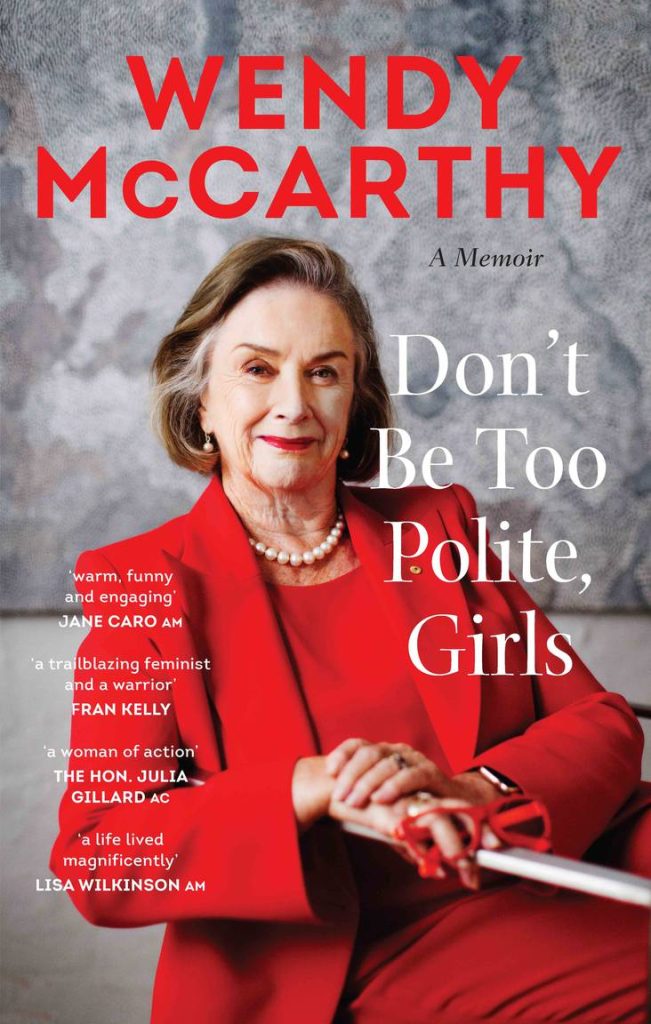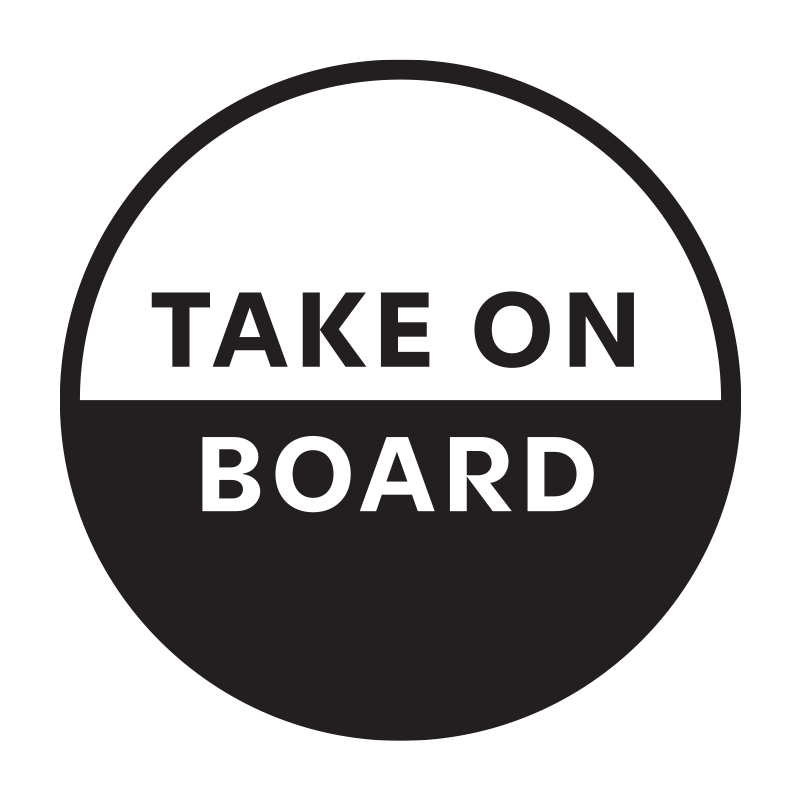Wendy McCarthy AO – an Australian businesswoman, activist and former university administrator – joined her first board of directors almost 50 years ago.
It was 1974. Feminism’s second wave was in full swing. Members of the Women’s Electoral Lobby (WEL) were encouraged to join the Family Planning Association of Australia (FPA) to vote for a new board, to drive reform and change, such as accessible contraception. Wendy was WEL’s Sydney chapter co-deputy convenor. She joined FPA and was elected to the board. WEL gained control of the association.
“To my surprise I was elected, albeit at the bottom of the ticket,” she wrote in her 2022 memoir, Don’t Be Too Polite, Girls. “It was my first board appointment and I was excited and apprehensive about the task.”
Wendy was 33 years old. As a wife, teacher and mum of three, she’d seen and experienced the sexual politics and discrimination of 1950s and 1960s Australia. But with a strong sense of self, a taste for adventure and the support of a progressive husband, the lifelong feminist built an impressive reformist (rather than revolutionary) corporate and boardroom careers.
“I am also pushing the view that being elected to commercial boards and parliaments is what matters most,” she once wrote. “As the seventies slogan reminds us, A Woman’s Place is Everywhere.”
Wendy joined the ABC board almost 40 years ago. It was 1983 and the 50-year-old ABC had just turned into a corporation “to become more innovative and competitive”. The secretary of the Department of Communications called to ask if she’d be deputy or chairman of the board. She was appointed, without an interview. As said in the Don’t Be Too Polite, Girls extract below, her “advocacy had to be for the advancement of women in the corporation”.
The ABC was her first big board – a tenure that lasted 8 years. She would come to sit on many boards in the following decades, as well as launch her own business (McCarthy Mentoring) and continue to advocate for women’s issues and organisations (she’s ambassador for 1 Million Women).
Wendy ‘came out semi-retirement in 2019 to front the push to finally decriminalise abortion in NSW’. Although semi-retirement for this trailblazer consists of speaking at events, mentoring, writing her memoir and advising organisations on issues such as gender equality.
She talks about this journey on episode 190 of the Take on Board podcast.
Wendy’s first “big board”
This is an extract from Wendy McCarthy’s Don’t Be Polite, Girls, published by Allen & Unwin.

I was forty-one, a feminist, a change agent, wife, mother, Executive Director of Family Planning Australia, member of the NSW Education Commission, member of the NSW Higher Education Board, Cleo columnist, and now Deputy Chair of the ABC. I was torn between joy and terror that I would be out of my depth. But I had said yes, and for the next eight years I was Deputy Chair and devoted to my role.
The entire Board had been replaced and for the most part the headlines were positive, but it soon became clear that many of the senior managers were resisting change. The chairman, by contrast, was impatient for change. The ABC I joined was a place where women were not visible in senior management and only two of the fifty members of the Senior Officer’s Association (SOA) were women. They suffered from the idea that this was okay. There were few women’s voices on air. It’s hard now for people to remember that no woman read the news, but trust me, such was the case.
My advocacy had to be for the advancement of women in the corporation. My female colleagues on the board, Jan Marsh and Sister Veronica Brady, decided we should work together to establish Board policy to structurally assist women. For example, all interviewing committees would have a female member, and all jobs were to include a female candidate. We supported work-based childcare and insisted that all new ABC buildings would make provision for this. This strategy was supported by the Board and provided a policy framework we could work with.
This remains a good learning thought for young women coming onto boards today—get strategic with your colleagues when you are trying to change the system.
In August 1984, the Board and management held a two-day meeting to agree on some future directions. Out of that came the ABC’s first corporate plan: a secretariat created to assist the board and management with implementation. The Chairman encouraged each of us to take ownership of particular issues. A good example was Dick Boyer, who was committed to writing a philosophy of the ABC, which resulted in a publication, The Role of the National Broadcaster in Contemporary Australia. It powerfully spelt out the national broadcasting commitment to expanding the range and experience of being Australian. It recognised the ABC’s pivotal role in that task. It remains relevant today.
A key role for the chair is to bring the directors together and work in a collegiate way. It requires trust and leadership. Board business takes time and consideration. Ken found meetings irritating because he wanted instant outcomes.
A good example was his commitment to having a staff-elected director on the Board. When advised it would take time to select one, he said, ‘You want a person on the Board you choose one today or there is no spot. I am the Chairman of the Board and that is how it is going to be. There is no time to wait and I want someone now.’ Tony Bond was selected.
I had a much higher tolerance and regard for process, and would try to keep him buoyant, as did other board members. Every time we had a meeting in Sydney, Ken and I would walk around Hyde Park at lunchtime and sometimes visit the ground floor of David Jones department store. It was good to debrief the morning’s meeting, get some fresh air and let him check out what DJs were doing as they were Myer’s competitors.
These board meetings could run for ten hours and in the interests of health a walk in the park and a cruise through a beautiful shop with a pianist playing was the perfect switch-off. Ten hours is a long time to be in a boardroom without respite, especially if it is a two-day meeting with a Board dinner overnight.
Building trusted relationships with my colleagues is always a priority for me. In highly functioning boards there must be trust between board and management. This does not preclude dissent or argumentative discourse. In the best boards, the relationships within the board, and with management, are complex. It must be strong and trusting but distant enough so that it does not impact independence and the role of the non-executive director.
Relationships with stakeholders are also crucial in enabling good governance and board effectiveness. Our stakeholders included the Australian community and the Commonwealth Parliament. I rarely met a person in my time as a director who would refrain from advising me how best to do my job and serve the Australian community. I always saw this as a measure of trust and ownership of the ABC—something to be cherished, not resisted.
The Chairman insisted we use an executive search firm to manage the process. This was outside the experience of directors, but Ken was persuasive and said the price doesn’t matter, broadcasting is part of a global communications revolution, and we must look for the best person in the world, who may or may not be Australian. It doesn’t sound so unusual now, but it was big thinking back then. Nobody really argued against this, fearful that they might be seen to be a small thinker. But most of us had concerns that maybe an Australian would understand our culture better. This is now the conventional way to appoint directors and senior executives.
After hours of interviews, discussions and media beat-ups, Geoffrey Whitehead from New Zealand was appointed. He was the only candidate with skills in broadcasting and broad- casting management in an international environment. He had work experience in the United Kingdom and New Zealand and was a cleanskin who owed no political favours and no internal broadcasting favours. It was a unanimous decision after the second interview.
When I called Michael Duffy, the Communications Minister, as the media announcement was being released, his response was, ‘Geoffrey who?’ I explained. ‘Well,’ he said, ‘that’s a surprise. I wish you the best of luck and hope you’ve got the right person for the job.’
